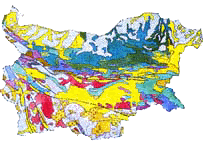
Research Activities of
the Geological Institute, BAS
Research Activities
The Geological Institute is the largest and most complex Bulgarian research organization in geology.
The research activities include fundamental and applied problems in the main branches of the geological knowledge: paleontology, stratigraphy, sedimentology, geotectonics, regional geology, petrology, geochemistry, mineralogy, mineral deposits, hydrogeology, engineering geology and geoecology. All projects under development are in close relation to the national priority of the Bulgarian society and the requirements of the sustainable development.
National projects:
- Geology of Bulgaria. This project aims to summarize the so far available data on the geology of Bulgaria as a basis for any further scientific and applied earth science projects.
- Studies on the paleobiodiversity and climatic changes in the geological records, emphasizing on some global climatic events and their consequences in respect to the present-day global climatic changes.
- Investigations on the young and active tectonics of the region, including the relation between fault activity and seismicity.
- Studies on the mineral resources of Bulgaria and their impact on the sustainable development.
- Studies on the geological ground of industrial constructions and namely such of the nuclear power engineering and the preservation of nuclear wastes.
- Studies on the landslide hazard in Bulgaria.
- All fundamental projects are funded by the National Council for Scientific Researches to the Ministry of the Education and Science. Presently, 34 projects are under development; among them 27 have project-leaders from the Geological Institute.
International collaboration:
The researchers of the Geological Institute are actively involved in numerous international research programs. Some recent accomplished as well as presently active projects are:
- NATO Project under the Program “Science for Peace” 973739 Watmetapol “Dynamics, evolution and limitation of heavy metal water pollution in the Plovdiv region (Bulgaria)”. This project focuses on the pollution of the environment around the plant for production of base metals near Asenovgrad (Plovdiv District). The acquired 3-D hydrodynamic and hydrochemical model is used for the prognostic and management of the waters and the restriction of the heavy metals pollution in the area.
- “Site selection and site characterization for Radioactive Waste (RAW) disposal”. This is a joint project with the Belgium Nuclear Scientific Center SCK-CEN. This topic is of exceptional importance for the sustainable development of the energy sector of Europe as well as for the European integration of Bulgaria.
- Several UNESCO project treat the problems of the geological hazard and the sustainable development of the Balkan region, namely: “Expert assessment of the subsidence in relation to the hydro geological end engineer geological conditions in the areas of Sofia, Skopie and Tirana”; “Seismic and hydrogeological vulnerability of the geoecology and the society in the Balkan region”.
- A group of projects under the IGC Program of UNESCO integrates the researches of our scientists to these of the world scientific community.
- Under the EU Program COST is developed the project “3-D monitoring of some active tectonic structures”. This project integrates our studies to these of the EU member-countries in the prognostic of hazardous geological processes (earthquakes, landslides, etc.) all over Europe.
- The ESF project “Geodynamics and ore-forming evolution in the Alps-Balkan-Carpathian-Dinaride Region” aims the integrate study of the tectonic setting, distribution and ore-forming processes of the large ore deposits.
Presently the researchers of the Geological Institute are involved in 13 international collaborative projects.
This page is maintained by: L.Nachev
Last modified: 10 April 2006
Copyright (C) 1996-2006 Geological Institute - BAS
All rights reserved
Return to: Home Page
